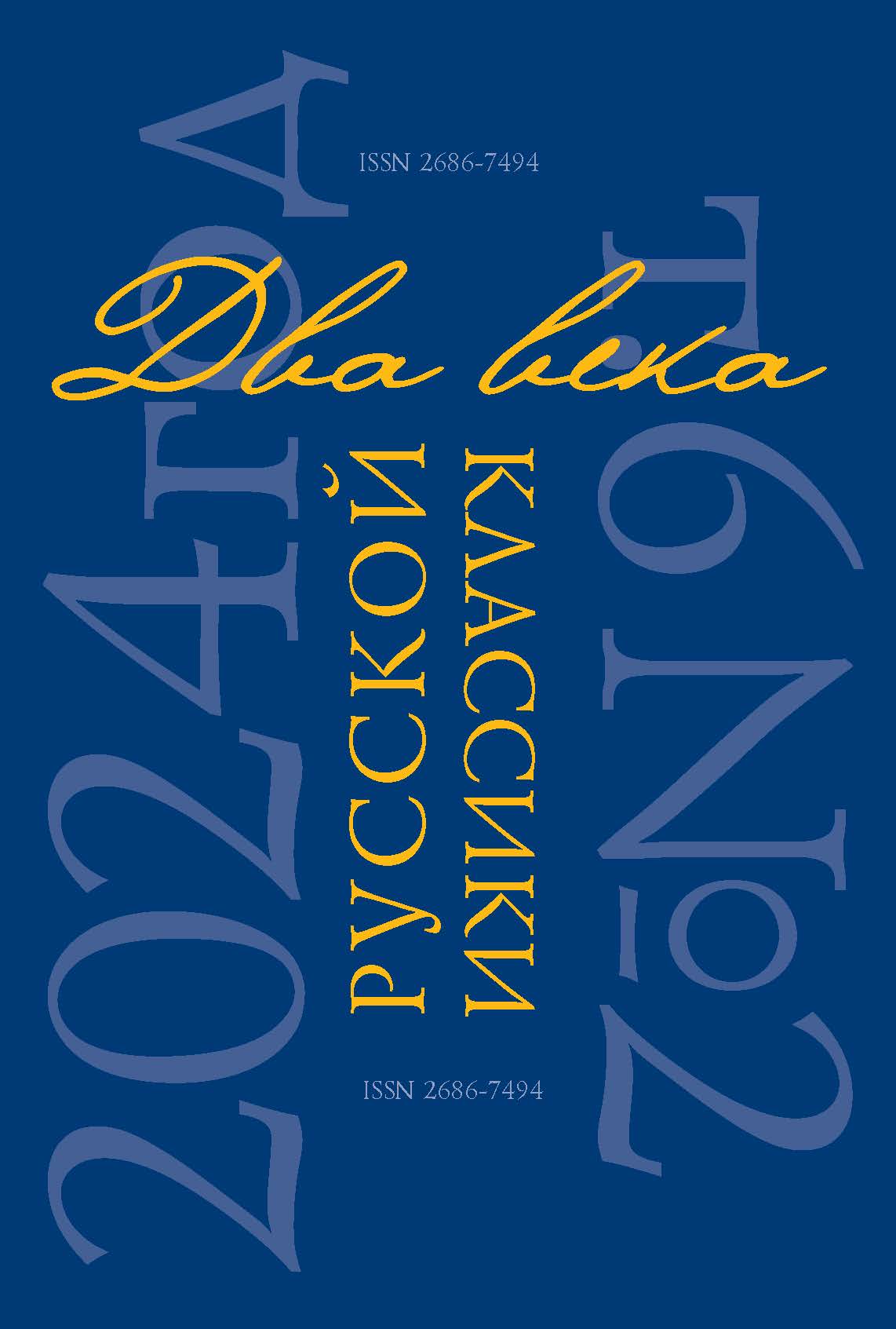Abstract:
The article raises the fundamental problems of textual criticism of N. V. Gogol’s story “Taras Bulba.” The author of the article provides an analytical review of the translation and publishing practice of representatives of Ukrainian nationalism of the 19th–20th centuries, the features of the publications of Gogol’s story with textological “innovations” by P. A. Kulish, M. O. Lobodovsky, M. Sadovsky (N. K. Tobilevich), I. A. Malkovich. The distinctive feature of the listed cases is the ideological character of the violation of the fundamental scientific principle of choosing the final wording of the text. The preference for the publication of the early edition of Taras Bulba over the later one leads to the fact that Taras Bulba’s famous speech about partnership, the image of the path of the traitor Andriy to enemies, the words of the Cossacks before death about devotion to faith and homeland, Gogol’s prophecy about Russian tsar and the narrator’s exclamation about the irresistible Russian power became “an appendix” without author’s context. The paper clearly shows the need for a comprehensive, complex solution of textual problems and the inadmissibility of ignoring the last writer’s will.
References
Bocharov, S. G., and L. V. Deriugina. “Kommentarii” [“Commentary”]. Gogol’, N. V. Polnoe sobranie sochinenii: v 23 t. [Complete Works: in 23 vols.], vol. 3, texts prep. by L. V. Deriugina, comm. by S. G. Bocharov, L. V. Deriugina. Moscow, Nauka Publ., 2009, pp. 463–983. (In Russ.)
Vinogradov, I. A. “Pervyi biograf Gogolia” [“The First Biographer of Gogol”]. Kulish, P. A. Zapiski o zhizni Nikolaia Vasil’evicha Gogolia, sostavlennye iz vospominanii ego druzei i znakomykh i iz ego sobstvennykh pisem [Notes on the Life of Nikolai Vasilyevich Gogol, Compiled from the Memoirs of His Friends and Acquaintances and from His Own Letters], publ. by I. A. Vinogradov. Moscow, IWL RAS Publ., 2003, pp. 3–81. (In Russ.)
Vinogradov, I. A. “Kommentarii” [“Commentary”]. Gogol’, N. V. Taras Bul’ba. Avtografy, prizhiznennye izdaniia. Istoriko-literaturnyi i tekstologicheskii kommentarii [Taras Bulba. Autographs, Lifetime Editions. Historical-literary and Textual Commentary], publ. by I. A. Vinogradov. Moscow, IWL RAS Publ., 2009, pp. 385–656. (In Russ.)
Vinogradov, I. A. “1812 god i ‘Taras Bul’ba’: proshedshee i nastoiashchee v zamysle N. V. Gogolia” [“1812 and ‘Taras Bulba’: Past and Present in N. V. Gogol.”]. 1812 god i mirovaia literatura [1812 and World Literature]. Moscow, IWL RAS Publ., 2013, pp. 91–140. (In Russ.)
Vinogradov, I. A. “1812 god v geroiakh ʽTarasa Bul’by’ i ʽMertvykh dush’.” [“1812 in the Characters of ʽTaras Bulba’ and ʽDead Souls’.”]. Vestnik Literaturnogo instituta, 2015, no. 2, pp. 37–41. (In Russ.)
Vinogradov, I. A. “ʽTaras Bul’ba’ i Russkaia istoriia XIX–XX vv.” [“ʽTaras Bulba’ and Russian History of the 19th–20th Centuries”]. Shcherbakova, M. I., and V. G. Andreeva, editors. Literaturnyi protsess v Rossii XVIII–XIX vv. Svetskaia i dukhovnaia slovesnost’ [The Literary Process in Russia in the 18th–19th Centuries. Secular and Spiritual Literature], issue 3. Moscow, IWL RAS Publ., 2022, pp. 97–168. (In Russ.)
Vorontsov, A. V. “Prorok i gesheftmakhery” [“Prophet and Gesheftmakhery”]. Nash sovremennik, 2008, no. 4, pp. 256–265. (In Russ.)
Dolgopolov, L. K. “Gogol’ v nachale 1840-kh godov (‘Portret’ i ʽTaras Bul’ba’: vtorye redaktsii v sviazi s nachalom dukhovnogo krizisa)” [“Gogol in the Early 1840s (‘Portrait’ and ʽTaras Bulba’: Second Editions in Connection with the Onset of a Spiritual Crisis)”]. Russkaia literatura, 1969, no. 2. pp. 82–104. (In Russ.)
Il’chenko, S. “Kak popravili Tarasa Bul’bu” [“How Taras Bulba was Corrected”]. Delovoi vtornik. Prilozhenie k gazete “Tribuna,” no. 44, December 5, 2000, p. 2. (In Russ.)
Korneichuk, M. “ʽIa tebia porodil, ia tebia i ub’iu!’ Kak natsional-patrioty ‘prikhvatizirovali’ N. Gogolia” [“ʽI Gave Birth to You, I will Kill You!’ How the National Patriots ʽGrabbed’ N. Gogol”]. Pravda, no. 65, June 15–16, 1999, p. 2. (In Russ.)
Lugovoi, A. E. “Doklad 14.04.09 <g.> na prepodavatel’sko-studencheskoi konferentsii v Zakarpatskom filiale Kievskogo slavisticheskogo universiteta” [“Report at the Teachers and Student Conference in the Transcarpathian Branch of the Kiev Slavic University, 14.04.09”]. Desiat’ let s Gogolem. Russkie Zakarpat’sia khraniat pamiat’ o velikom russkom pisatele. Literaturno-dokumental’noe izdanie [Ten Years with Gogol. The Russians of Zakarpattya Keep the Memory of the Great Russian Writer. Literary and Documentary Edition], comp. by V. N. Saltykov, ed. by E. M. Vakhmianina. Uzhhorod, [S. n.], 2017, pp. 101–104. (In Russ.)
“Ot redaktsii” [“From the Editors”]. Gogol’, N. V. Polnoe sobranie sochinenii: v 23 t. [Complete Works: in 23 vols.], vol. 1, text prep. and comm. by I. Iu. Vinnitsky, E. E. Dmitrieva, Iu. V. Mann, K. Iu. Rogov. Moscow, Nasledie Publ., 2001, pp. 5–24. (In Russ.)
Prokopenko, V. “Taras Bul’ba mestnogo razliva” [“Local Taras Bulba”]. Moskovskii komsomolets, July 18–25, 2002, p. 28. (In Russ.)
Prokopenko, V. “Zamashka ukrainskoi natury: ʽTaras Bul’ba’ v samostiinom perevode” [“The Habit of Ukrainian Nature: ‘Taras Bulba’ in an Independent Translation.”]. Rodina, no. 4, 2003, pp. 58–59. (In Russ.)









